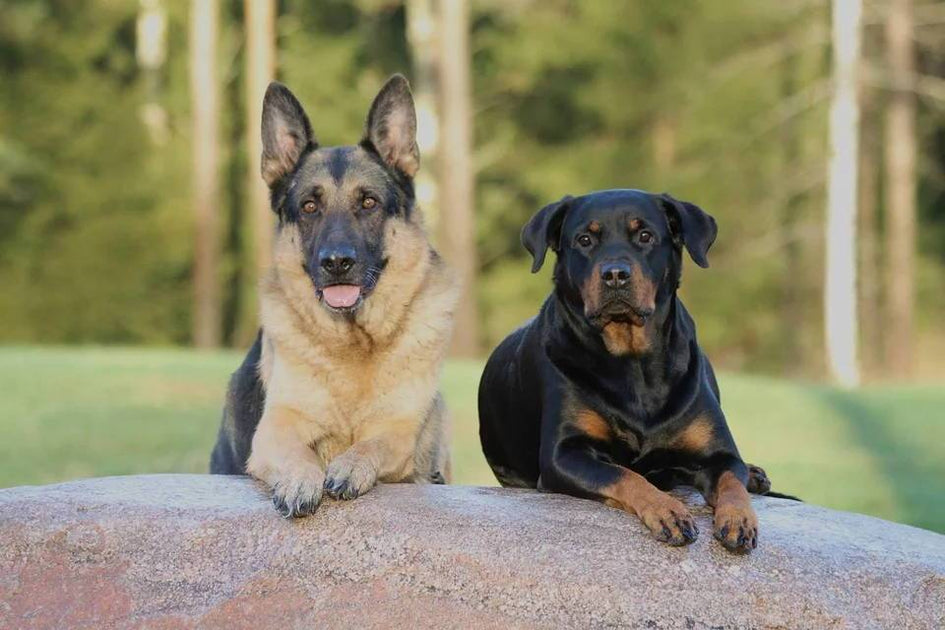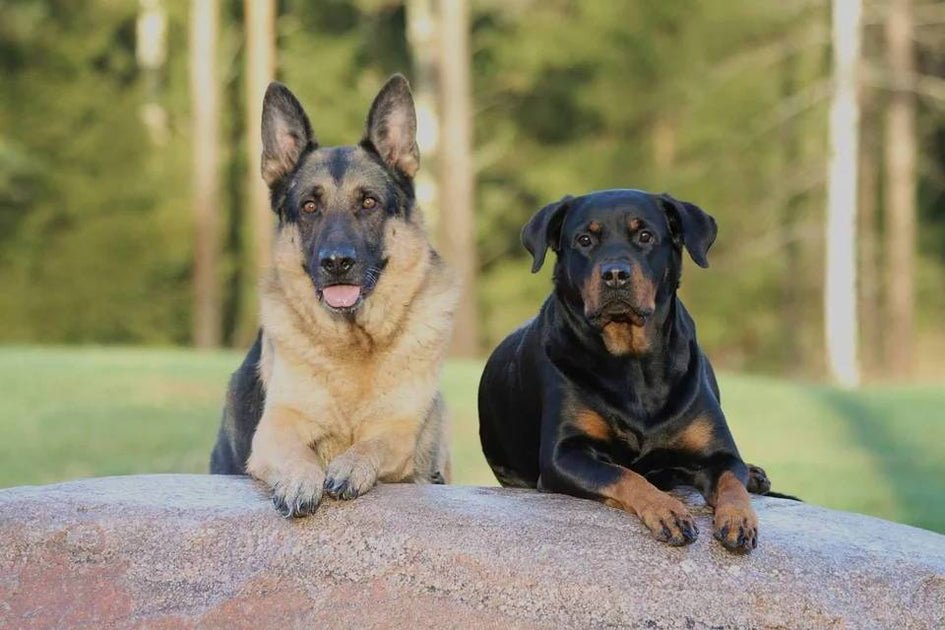Are you curious about whether Rottweilers and German Shepherds get along? Well, let’s find out! 🐶 When it comes to these two popular dog breeds, many people wonder if they will make good companions. So, let’s dive in and explore the dynamic between Rottweilers and German Shepherds.
As an aspiring dog owner, it’s crucial to know how different breeds interact with each other. Plus, when you combine the strength and loyalty of a Rottweiler with the intelligence and protectiveness of a German Shepherd, you get quite a combination. So, let’s take a closer look at their compatibility.
Rottweilers and German Shepherds are both strong, intelligent, and protective breeds. But how well do they get along? Let’s uncover the answer and help you make an informed decision. 🐾
Curious about the compatibility between Rottweilers and German Shepherds? These two breeds can get along famously! Both breeds are intelligent, loyal, and protective. However, proper introductions and socialization are crucial for a harmonious relationship. Start by providing separate spaces for each dog, gradually introducing supervised interactions, and using positive reinforcement. It’s important to remember that individual personalities and temperaments play a significant role. With patience and training, Rottweilers and German Shepherds can form a strong bond and be great companions.

Do Rottweilers and German Shepherds Get Along?
Welcome to our ultimate guide on Rottweilers and German Shepherds! If you’re wondering whether these two popular dog breeds can get along, you’ve come to the right place. In this article, we’ll explore the relationship dynamics between Rottweilers and German Shepherds, their compatibility, and provide you with valuable insights to help you make an informed decision about bringing these breeds into your home.
Can Rottweilers and German Shepherds Coexist Peacefully?
1. The Similarities Between Rottweilers and German Shepherds
Despite their physical differences, Rottweilers and German Shepherds share common characteristics that can contribute to a harmonious coexistence. Both breeds are intelligent, loyal, and protective. They have strong guarding instincts and make excellent working dogs. Additionally, Rottweilers and German Shepherds are known for their trainability and versatility, which can make them good candidates for various activities such as obedience training, agility, and search and rescue operations.
Another similarity between these breeds is their need for mental and physical stimulation. Both Rottweilers and German Shepherds are energetic and require regular exercise to maintain their well-being. Providing them with enough activities and outlets for their energy can prevent boredom and potential behavioral issues.
Furthermore, Rottweilers and German Shepherds tend to be protective of their families. While this can be a desirable trait, it’s essential to ensure proper socialization and training from an early age to prevent any territorial or aggressive behavior towards other dogs.
2. Considerations for a Successful Coexistence
While Rottweilers and German Shepherds have similarities, there are also factors that can affect their ability to coexist peacefully. It’s crucial to consider these aspects before introducing these breeds into the same household:
- Size and Strength: Rottweilers are generally larger and more robust than German Shepherds. This size difference can lead to dominance issues and potential conflicts if not appropriately managed. Supervision and proper training are key to ensure a peaceful cohabitation between these breeds.
- Gender and Neutering: The gender of the dogs and whether they have been neutered can also play a role in their compatibility. Generally, opposite-sex pairings tend to have a higher likelihood of getting along compared to same-sex pairings. Neutering can also help reduce aggression and territorial behavior.
- Socialization: Early and thorough socialization is crucial for both Rottweilers and German Shepherds. Introducing them to various environments, people, and other dogs can help them develop positive associations and reduce the likelihood of conflicts later on.
3. Managing the Introduction and Relationship Between Rottweilers and German Shepherds
When introducing a Rottweiler and a German Shepherd, it’s important to follow a gradual and controlled process to minimize the chances of a negative interaction. Here are some steps to consider:
- Neutral Territory: Choose a neutral location, such as a park or a friend’s backyard, for the initial introduction. This helps prevent territorial issues and reduces the likelihood of conflicts.
- Controlled Interaction: Keep both dogs on a leash during the first encounter and allow them to sniff and observe each other from a safe distance. Gradually decrease the distance while observing their body language for signs of aggression or discomfort.
- Positive Reinforcement: Reward both dogs with treats and praise when they display calm and friendly behavior towards each other. This positive reinforcement helps establish a positive association and reinforces good behavior.
4. Seeking Professional Guidance
If you’re unsure about introducing a Rottweiler and a German Shepherd or if you’re experiencing difficulties in their coexistence, it’s advisable to seek the assistance of a professional dog trainer or behaviorist. These experts can assess the situation and provide personalized guidance to ensure a harmonious relationship between these breeds.
5. The Benefits of Owning Rottweilers and German Shepherds
Despite the considerations, the coexistence of Rottweilers and German Shepherds can bring numerous benefits to their owners:
- Companionship and Loyalty: Both breeds are known for their loyalty and strong bonds with their owners. Owning a Rottweiler or German Shepherd can provide you with a lifelong companion and a steadfast protector.
- Active Lifestyle: Rottweilers and German Shepherds thrive in active households where they can participate in various activities. From hiking to agility training, these breeds can keep up with an active lifestyle.
- Working Potential: If you’re looking for a versatile working dog, both Rottweilers and German Shepherds excel in different fields, including search and rescue, police work, and service tasks.
6. Tips for a Successful Coexistence
Here are some additional tips to ensure a successful and peaceful coexistence between Rottweilers and German Shepherds:
- Neuter both dogs to reduce aggression and territorial behavior.
- Provide equal attention and affection to both breeds to prevent jealousy and rivalry.
- Establish clear boundaries and rules within the household to manage potential conflicts.
- Supervise interactions between the dogs, especially during the initial stages of their relationship.
- Enroll both dogs in obedience training classes to reinforce their training and socialization.
Conclusion
While there is no definitive answer to whether Rottweilers and German Shepherds can get along, their compatibility depends on various factors such as their individual personalities, training, and socialization. By understanding their similarities, considering the necessary precautions, and seeking professional guidance when needed, you can increase the chances of a successful coexistence between these breeds. Remember, it is essential to prioritize the well-being and safety of your pets above all else. If you decide to bring a Rottweiler and a German Shepherd into your home, prepare to invest time, effort, and love into fostering a positive and harmonious relationship between these impressive breeds.
Key Takeaways: Do Rottweilers and German Shepherds Get Along?
- Rottweilers and German Shepherds can get along well if properly introduced and socialized from a young age.
- Both breeds have strong protective instincts, which can lead to conflicts if not managed.
- Early socialization and training are crucial to ensure a harmonious relationship between Rottweilers and German Shepherds.
- Supervision is essential when introducing these breeds to each other, especially in the beginning.
- Positive reinforcement training methods can help create a positive association between Rottweilers and German Shepherds and improve their chances of getting along.
Frequently Asked Questions
Welcome to our Frequently Asked Questions section on whether Rottweilers and German Shepherds get along. If you’re considering bringing both breeds into your home or you already have them and want to know how they will interact, you’re in the right place. Here, we’ll address some common concerns and provide insights into their compatibility.
1. Can Rottweilers and German Shepherds live together peacefully?
Yes, Rottweilers and German Shepherds can get along and live together harmoniously. Both breeds are known for their loyalty, intelligence, and protective instincts, which can make them excellent companions. However, it’s important to note that each dog has its own unique personality, so compatibility may vary. Proper socialization, training, and introducing them at a young age can greatly increase the likelihood of a successful coexistence.
Always supervise their initial interactions to ensure they are comfortable with each other. Slowly introduce them in neutral territory, encouraging positive experiences and rewarding good behavior. With time, patience, and ongoing training, Rottweilers and German Shepherds can form a strong bond and become best friends.
2. Do Rottweilers and German Shepherds have similar temperaments?
Rottweilers and German Shepherds share some common traits in terms of temperament, making them potentially compatible. Both breeds are intelligent, protective, and trainable. They are typically loyal to their families and can be excellent guard dogs. However, there are slight differences in their behavior and personality.
Rottweilers are known for their calm and confident demeanor, while German Shepherds are more energetic and active. German Shepherds may also have a stronger drive to work and require more mental and physical stimulation. It’s important to consider these differences when assessing their compatibility. Proper training, exercise, and mental enrichment activities can help balance their temperament and ensure a harmonious coexistence.
3. Can Rottweilers and German Shepherds be aggressive towards each other?
While Rottweilers and German Shepherds can be protective and have a natural guarding instinct, aggression between them is not common when properly trained and socialized. Aggression is often a result of improper handling, lack of socialization, or inadequate training, rather than a breed-specific issue. Early socialization, positive reinforcement training methods, and consistent discipline can help prevent aggression and create a peaceful environment.
If you notice any signs of aggression, such as growling or snapping, it’s crucial to seek professional help from a qualified dog trainer or behaviorist. They can assess the situation, identify the underlying causes, and provide guidance on how to address and manage any aggression effectively.
4. Are there any specific considerations when introducing a Rottweiler and a German Shepherd?
When introducing a Rottweiler and a German Shepherd, there are a few key considerations to keep in mind. Firstly, introduce them in a neutral space where neither dog feels territorial. This can help prevent any initial conflicts or tension. Secondly, gradually increase the duration of their supervised interactions, watching closely for any signs of discomfort or aggression.
Additionally, ensure both dogs have their own separate resources, such as food bowls, toys, and sleeping areas. This helps prevent potential conflicts over resources and minimizes the chances of territorial behavior. Lastly, provide both dogs with individual attention, exercise, and mental stimulation to avoid jealousy or competition for attention.
5. What are some signs of positive interaction between Rottweilers and German Shepherds?
Positive interactions between Rottweilers and German Shepherds can be observed through various signs. These include relaxed body language, wagging tails, and reciprocal play behavior. Play bows, where one dog crouches with front legs extended and rear in the air, are often a positive sign and can indicate a desire to engage in play. Both dogs may also take turns chasing or playfully nipping at each other without any signs of aggression.
It’s important to note that the dynamics between dogs can take time to develop, so don’t be discouraged if they don’t immediately become best friends. With consistent positive experiences and reinforcement, their relationship can grow and strengthen over time.

WHY I CHOSE THE ROTTWEILER OVER THE GERMAN SHEPHERD
Summary
Rottweilers and German Shepherds can get along well if properly socialized and trained. It’s important to introduce them slowly and supervise their interactions.
Start by letting them meet in a neutral space and observe their body language. Give them positive experiences together and reward good behavior.
Remember to provide each dog with individual attention, exercise, and mental stimulation. With patience and consistency, these two breeds can form a strong bond and live harmoniously together.
